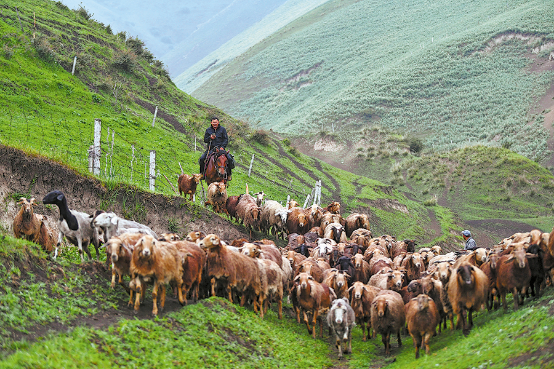新疆牧民转场传统遇新变

In Xinjiang, China, herders like Balatijan Eremubai still follow an old tradition: moving livestock (牲畜) to higher pastures (牧场) every summer. But today, this journey blends old ways with new ideas.
Each June, Balatijan and his family prepare for the trip. On the first day, they use a truck to carry their felt yurt (毡房) and things. “Trucks help us move heavy stuff faster,” says Balatijan. The next day, his wife and sons join in. They drive to the summer pasture and build yurts with his brother’s family. Motor vehicles make setting up home much easier!
On the third day, Balatijan rides his horse. He spends nine hours guiding 200 sheep through mountains. Rain and sun change quickly, but he stays strong. “It’s tiring, but it’s our life,” he says.
Life is changing in Xinjiang. Better roads and trucks mean fewer families need to move everything by animals. Young people can work in towns, while children go to school nearby. Elderly people can get healthcare easily. Now, only herders like Balatijan do the hard work, with help from trucks and their families.
The tradition continues, but with new tools. Balatijan hopes his sheep will grow healthy in the summer pastures. “We keep our way of life, but also welcome good changes,” he says.
原创编写 版权所有 侵权必究! 每日更新 个性化阅读 英语飙升!
1. 2. What makes their move easier?(推理判断)
A Their large family.
B Modern vehicles.
C Good weather.
D High mountains.
2. 3. Why does the writer mention “Rain and sun change quickly” in Paragraph 3?(推理判断)
A To show the time.
B To describe the road.
C To explain the danger.
D To tell the difficulty.
3. 5. What can we know from the last paragraph?(推理判断)
A Balatijan’s sadness.
B Balatijan’s worry.
C Balatijan’s satisfaction.
D Balatijan’s surprise.

